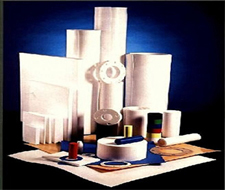PTFE (TFE)

Polytetrafluoroethylene (PTFE) is a synthetic fluoropolymer of tetrafluoroethylene that has numerous applications. The best known brand name of PTFE is Teflon by DuPont Co. PTFE is a fluorocarbon solid, as it is a high-molecular-weight compound consisting wholly of carbon and fluorine. PTFE is hydrophobic: neither water nor water-containing substances wet PTFE, as fluorocarbons demonstrate mitigated London dispersion forces due to the high electronegativity of fluorine. PTFE has one of the lowest coefficients of friction against any solid.
PTFE is used as a non-stick coating for pans and other cookware. It is very non-reactive, partly because of the strength of carbon–fluorine bonds and so it is often used in containers and pipework for reactive and corrosive chemicals. Where used as a lubricant, PTFE reduces friction, wear and energy consumption of machinery. It is also commonly used as a graft material in surgical interventions.
PTFE is a thermoplastic polymer, which is a white solid at room temperature, with a density of about 2200 kg/m3. According to DuPont, its melting point is 600 K (327 °C; 620 °F). It maintains high strength, toughness and self-lubrication at low temperatures down to 5 K (−268.15 °C; −450.67 °F), and good flexibility at temperatures above 194 K (−79 °C; −110 °F). PTFE gains its properties from the aggregate effect of carbon-fluorine bonds, as do all fluorocarbons. The only chemicals known to affect these carbon-fluorine bonds are certain alkali metals and most highly reactive fluorinating agents.
PTFE is a soft, nontoxic fluoropolymer (also known as Teflon®, which is a registered trademark of DuPont) with an extremely low coefficient of friction, meaning that few materials stick to it, and most that do stick can be peeled or rubbed off. PTFE also has outstanding chemical and weathering resistance. PTFE is insoluble in most organics and has excellent electrical properties. It remains stable at both cryogenic and elevated temperatures (from -400° F up to 500° F), though its mechanical properties are low compared to other engineering plastics. The mechanical, electrical and thermal properties of PTFE can be improved by adding fillers such as glass fiber, carbon, graphite, bronze and molybdenum disulfide (MoS2). Typical applications include seals, bearings, bushings, coil separators, terminals, and solid pipes and fittings.
Key Properties
Low coefficient of friction
High resistance to chemical agents and solvents
Excellent electrical properties
Stable over a wide range of temperatures
Nontoxic
Standard Shapes and Forms
Sheet – Molded: .125” – 6” thick
Skived: .001” - .250” thick
Rod – Molded: 3.75” – 12” diameter
Extruded: .125” – 6” diameter
Tubular Bar – Molded: 1.50” – 12” OD / .75” – 11” ID
Extruded: .250” – 3” OD / .060” – 2.50” ID
Other Forms – Film, Hexagonal Bar, Fasteners, Balls, Angles, Hex Rod, Tape and Fabric, Pipe & Fittings, Flexible Tubing.
Grades and Colors
Virgin Grade PTFE
Virgin grade PTFE is made from virgin PTFE resin. This grade comes in sheets, rods and tubes. Typical applications include seals, gaskets or structural components where temperature or chemical resistance is essential. Used especially for application requiring high purity, non-contamination and exceptional dielectric properties. Virgin, natural, unfilled formulations comply with one or more of the FDA’s guidelines for direct food contact at room temperature.
Virgin PTFE is a higher grade, pure material, and is more expensive. It is made with no recycled material added. It is chemically inert up to 500ºF, the best chemically resistant material available. Virgin has better physical properties and retains flexibility in low temperatures. It is a good electrical insulator, with high dielectric properties. It is FDA approved and is used in the pharmaceutical, food and beverage, and cosmetics industries. It is often used for medical or electrical applications. Virgin has better friction characteristics, which may be important in some applications.
Mechanical Grade PTFE
Mechanical Grade PTFE is made from reprocessed PTFE resin. This grade has extremely low friction and high service temperatures. Mechanical Grade PTFE is frequently specified for high performance bearings and bushings, particularly in applications that require resistance to corrosive chemicals.
Available Fills: PTFE mechanical properties can be improved by adding fillers such as Glass Fiber, Carbon, Graphite, Calcium, Ceramic, Bronze and Moly-Disulphide.
Mechanical PTFE is an economical, reprocessed PTFE with slightly lower physical properties than virgin grade. It is also referred to as "recycled" or "reclaimed". Reprocessed material is added during the manufacturing process; usually a small percentage but it varies. It is more economical than virgin. This is the grade used for most applications, for less demanding uses where high purity materials are not required, such as noncritical chemical, electrical, and mechanical applications. It has better wear resistance and compressive strength than virgin grade. Not suitable for food contact.
PTFE (TFE) Pictures



Get an instant offer on your damaged car

Get an offer instantly
Just tell us a bit about your car and boom, there's your offer.

Free pickup
You have seven days to accept our offer and schedule pickup.

Get paid on the spot
Our pickup partner will do a quick inspection, and hand you a check.